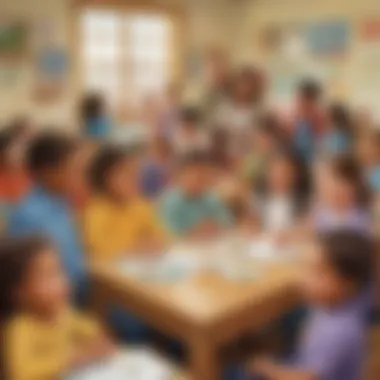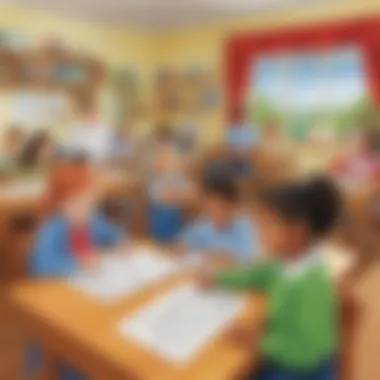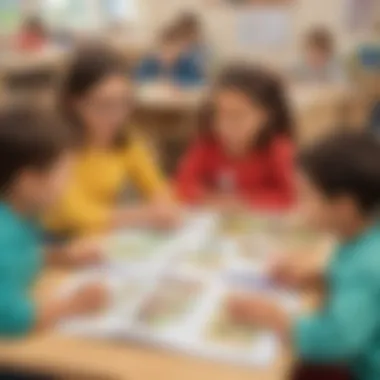Unlocking Kindergarten Social Studies Potential with Interactive Worksheets


Fun Activities Ideas
Social Studies for kindergarteners can be made engaging through a variety of fun activities that stimulate young minds. Indoor activities such as role-playing different professions or hosting a mini multicultural fair can introduce children to diverse cultures early on. Outdoor adventures like nature scavenger hunts or community mapping excursions help kids understand their surroundings and social interactions. Arts and crafts projects related to various countries or historical events can foster creativity while creating a tangible connection to the subject. Science experiments focusing on simple concepts like weather patterns or planting seeds can spark curiosity and a love for exploration. Moreover, cooking and baking activities tied to cultural dishes offer a hands-on experience in understanding different traditions and customs.
Educational Games
Integrating educational games into social studies curriculum can make learning enjoyable for kindergarteners. Math and logic games like sorting objects by country flags or counting coins can strengthen critical thinking skills. Language and vocabulary games such as word association with historical figures or labeling maps in social studies enhance language development. STEM activities like building structures that replicate famous landmarks or conducting simple experiments related to historical events engage kids in hands-on learning. History and geography puzzles provide a playful way to explore different cultures and locations. Interactive learning apps focused on social studies themes can make education accessible and interactive for young learners.
Seasonal and Holiday Activities
Connecting social studies themes to seasonal and holiday activities can deepen children's understanding of traditions and cultures. For instance, Valentine's Day crafts revolving around global versions of the holiday can introduce kids to diverse expressions of love. Halloween costume ideas inspired by historical figures or cultural icons blend creativity with educational elements. Thanksgiving cooking projects involving traditional dishes from different regions can teach children about various culinary traditions. Christmas decorations representing different countries' holiday customs showcase the richness of global celebrations. New Year's resolutions focusing on cultural awareness and empathy can instill values of inclusivity and appreciation for diversity.
Parenting Tips and Resources
Parenting tips for enhancing social studies education at home can empower caregivers to support children's learning. Encouraging creativity through open-ended projects related to social studies topics allows kids to express themselves while exploring different cultures. Setting up a playful learning environment with diverse books, maps, and artifacts creates a rich educational atmosphere at home. Balancing screen time and playtime ensures that children engage in hands-on activities that facilitate social studies comprehension. Building strong family bonds through discussions about global issues or heritage promotes empathy and cultural understanding. Motivating kids to stay active physically fosters a holistic approach to social studies education.
Fun Facts and Trivia
Incorporating fun facts and trivia into social studies lessons adds an element of intrigue and excitement for kindergarteners. Discovering interesting facts about the animal kingdom, such as unique behaviors or habitats, expands children's knowledge of wildlife. Exploring famous inventions stories and the impact of innovations on society encourages critical thinking and curiosity about history. Delving into historical events tailored for kids, like simplified narratives of significant moments, makes past events relatable and engaging. Uncovering mythical creatures from different cultures sparks imagination and introduces diverse folklore traditions. Engaging in space adventures and discoveries through age-appropriate stories or activities ignites an interest in science and exploration for young learners.
Introduction to Kindergarten Social Studies
In the realm of early education, Introduction to Kindergarten Social Studies plays a pivotal role in shaping young minds for future academic endeavors. Understanding social studies at a young age sets the foundation for critical thinking, cultural awareness, and community engagement. It serves as a precursor to instilling a sense of curiosity and exploration in students, priming them for a lifelong journey of citizenship and global understanding.
Understanding the Role of Social Studies in Early Education
The Purpose of Social Studies Curriculum
The Purpose of Social Studies Curriculum in kindergarten education is multifaceted. It aims to introduce students to diverse cultures, societies, and historical events, fostering a sense of empathy and understanding. By engaging with social studies concepts, children develop skills in critical analysis, problem-solving, and decision-making, essential for cognitive growth and academic success.
Impact on Cognitive Development
The Impact on Cognitive Development through social studies exposure aids in honing intellectual abilities such as memory retention, information processing, and analytical reasoning. By immersing children in social studies content, educators stimulate brain development and cognitive functions, enhancing overall learning experiences within the kindergarten setting.
Integration of Social Studies in Kindergarten Curriculum
Integrating Social Studies in the kindergarten curriculum provides a holistic approach to education. By intertwining social studies themes with other subjects, students grasp interconnectedness within the world, fostering a comprehensive understanding of their role as global citizens. This integration nurtures well-rounded individuals with a deep appreciation for diverse perspectives.
Benefits of Introducing Social Studies at a Young Age
Cultural Awareness
Introducing Cultural Awareness at a young age cultivates respect for different traditions, languages, and practices. Children develop a sense of empathy and inclusivity, promoting a harmonious coexistence in a multicultural society. Understanding diverse cultures lays the foundation for fostering global citizenship and interconnectedness.
Critical Thinking Skills
Developing Critical Thinking Skills from an early stage instills in children the ability to analyze information, make informed decisions, and evaluate multiple viewpoints. Social studies activities encourage students to think beyond surface-level observations, nurturing a habit of questioning, reasoning, and seeking logical explanations.
Community Engagement


Encouraging Community Engagement in kindergarten social studies initiatives fosters a sense of belonging and civic responsibility in young learners. By participating in community-focused projects and discussions, children develop a sense of agency, empathy, and social responsibility, paving the way for active participation in societal issues.
Significance of Free Worksheets in Kindergarten Social Studies
Interactive Learning Tools
Free Worksheets serve as Interactive Learning Tools that bring abstract concepts to life through hands-on activities, puzzles, and games. These tools engage students in active learning, fostering cognitive development and information retention through interactive experiences.
Promotion of Creativity
Exposing students to worksheets that promote Creativity unlocks their imaginative potential and innovative thinking. By encouraging artistic expression, storytelling, and visual representations, these worksheets nurture creative skills and a love for self-expression in young learners, enhancing their overall cognitive abilities.
Enhancement of Fine Motor Skills
Free Worksheets contribute to the Enhancement of Fine Motor Skills by incorporating activities that require precise movements, hand-eye coordination, and manual dexterity. Engaging in coloring, tracing, and cutting exercises not only enhances motor skills but also paves the way for improved handwriting, concentration, and spatial awareness in kindergarteners.
Exploring Free Worksheets for Kindergarten Social Studies
Exploring Free Worksheets for Kindergarten Social Studies plays a vital role in enhancing early education by providing young learners with interactive and engaging tools to foster cognitive development. These worksheets serve as valuable resources that facilitate learning in a fun and practical manner. By immersing children in diverse social studies topics through worksheets, educators can stimulate their curiosity and instill essential knowledge that forms the basis of their social understanding.
Types of Social Studies Worksheets Available
Geography Worksheets
Geography Worksheets offer a unique perspective on the world, allowing kindergarteners to explore different countries, continents, and regions. These worksheets not only enhance spatial awareness but also introduce young minds to the concept of diversity and interconnectedness. By engaging with Geography Worksheets, children develop a fundamental understanding of the Earth's features and the importance of geographic literacy.
Citizenship Worksheets
Citizenship Worksheets focus on nurturing a sense of civic responsibility and community awareness among kindergarteners. Through activities centered around rights, responsibilities, and contributions, these worksheets help children appreciate the value of being active and engaged members of society. Citizenship Worksheets also encourage empathy, respect, and understanding of diverse perspectives, laying the groundwork for future social interactions.
History Worksheets
History Worksheets delve into the past, unraveling stories of civilizations, events, and key figures that have shaped the world. By exploring historical narratives tailored for young learners, children can grasp overarching themes, timelines, and cause-and-effect relationships. History Worksheets promote a sense of continuity and heritage, instilling pride in cultural identities and fostering a deeper appreciation for the complexities of human history.
Interactive and Engaging Worksheet Activities
Mapping Activities
Mapping Activities spark children's interest in geography and cartography, enabling them to create visual representations of their surroundings and imaginary worlds. These activities enhance spatial reasoning, fine motor skills, and creativity, inviting young learners to explore map symbols, directions, and scale in a playful and educational manner.
Community Helper Worksheets
Community Helper Worksheets introduce kindergarteners to various roles within society, ranging from firefighters and doctors to teachers and police officers. By engaging with these worksheets, children develop an understanding of community interdependence, respect for diversity, and appreciation for different professions. Community Helper Worksheets promote social awareness and empathy, encouraging children to envision their future contributions to society.
Timeline Exercises
Timeline Exercises chronicle historical events in a sequential format, helping children grasp the concept of time progression and contextualize key milestones. By plotting significant moments on timelines, kindergarteners develop a sense of chronology, periodization, and historical continuity. Timeline Exercises provide a visual scaffolding for understanding past events and their relationships, fostering a deeper connection to narratives from the past.
Incorporating Technology in Social Studies Worksheets
Digital Interactive Worksheets


Digital Interactive Worksheets leverage technology to offer engaging and dynamic learning experiences for young learners. By integrating multimedia elements, interactive quizzes, and animations, these worksheets capture children's attention and cater to diverse learning styles. Digital Interactive Worksheets bridge the gap between traditional paper-based activities and modern digital enhancements, creating a seamless blend of educational content and interactive features.
Online Resources for Social Studies
Online Resources for Social Studies provide access to a vast repository of educational materials, curriculum guides, and interactive tools for both educators and students. These resources offer a diverse range of social studies topics, lesson plans, and multimedia resources that cater to varying learning needs. By tapping into online platforms, kindergarteners can explore virtual museums, historical archives, and interactive simulations that enrich their social studies learning experience.
Augmented Reality Applications
Augmented Reality Applications revolutionize traditional learning by superimposing digital content onto the physical world, creating immersive and interactive environments for kindergarteners. By utilizing Augmented Reality Applications in social studies worksheets, children can visualize historical landmarks, explore cultural artifacts, and engage with dynamic simulations that bring abstract concepts to life. Augmented Reality Applications enhance spatial cognition, sensory engagement, and technological literacy, offering a cutting-edge approach to social studies education.
Effective Strategies for Implementing Free Worksheets
Implementing free worksheets effectively in kindergarten social studies is crucial for enhancing students' learning experience and overall educational development. By utilizing tailored strategies, educators can maximize the benefits of these resources and create a dynamic learning environment for young learners. A structured approach to implementing free worksheets ensures that students engage meaningfully with the material, fostering a deeper understanding of social studies concepts.
Creating a Structured Lesson Plan
Creating a structured lesson plan is fundamental to the success of incorporating free worksheets in kindergarten social studies. By aligning the lesson plan with curriculum standards, teachers can ensure that the content is relevant and meets educational objectives. Sequencing activities in a logical order allows for a progressive learning experience, building upon previous knowledge and skills. By incorporating real-world examples, educators can contextualize concepts, making them more relatable and tangible for students.
Aligning with Curriculum Standards
Aligning lesson plans with curriculum standards is essential as it ensures that students are meeting educational requirements while engaging with free worksheets. This approach facilitates a cohesive learning experience that supports the overall learning goals of the kindergarten social studies curriculum. Incorporating curriculum standards into lesson plans also helps educators track student progress effectively and assess the impact of free worksheets on student learning outcomes.
Sequencing Activities
Sequencing activities in a thoughtfully structured manner aids in the progressive development of students' social studies skills. By organizing activities sequentially, educators can guide students through a coherent learning journey that builds upon previously acquired knowledge. This approach enhances students' comprehension and retention of social studies concepts, fostering a more profound understanding of the subject matter.
Incorporating Real-World Examples
Integrating real-world examples into lesson plans enhances students' understanding of abstract social studies concepts by grounding them in tangible, real-life scenarios. By relating classroom content to everyday experiences, educators can make learning more meaningful and engaging for students. Real-world examples also help students make connections between theory and practice, encouraging critical thinking and problem-solving skills.
Encouraging Critical Thinking and Discussion
Encouraging critical thinking and discussion in kindergarten social studies cultivates students' analytical skills and promotes active engagement with the material. By fostering an environment where students are encouraged to question, discuss, and debate social studies topics, educators can stimulate independent thinking and collaborative learning.
Promoting Class Discussions
Promoting class discussions encourages students to voice their opinions, share perspectives, and engage in meaningful dialogue surrounding social studies concepts. By facilitating structured discussions, educators can create a forum for students to articulate their thoughts, listen to peers, and develop communication skills. Class discussions also promote active participation and deepen students' understanding of diverse viewpoints.
Encouraging Questioning
Encouraging students to ask questions fosters a culture of curiosity and inquiry in the classroom. By prompting students to inquire about social studies topics, educators ignite students' interest and promote critical thinking. When students are encouraged to ask questions, they become active participants in their learning journey, taking ownership of their educational exploration and deepening their understanding of social studies concepts.
Facilitating Group Activities
Facilitating group activities in kindergarten social studies encourages collaboration, teamwork, and peer learning. By engaging students in group tasks, educators promote social skills, communication, and problem-solving abilities. Group activities also create an inclusive learning environment where students can exchange ideas, work together towards common goals, and benefit from diverse perspectives.
Assessment and Feedback in Kindergarten Social Studies
Effective assessment and feedback mechanisms play a vital role in evaluating student progress, identifying learning needs, and enhancing the overall educational experience in kindergarten social studies. By implementing structured assessment tools and fostering regular feedback channels, educators can track student development and tailor instruction to meet individual learning requirements.


Observational Assessment Techniques
Observational assessment techniques allow educators to gather valuable insights into students' learning behaviors, preferences, and strengths. By observing students in various learning activities, educators can assess performance, engagement levels, and interaction with social studies content. Observational assessment provides a holistic view of student progress, enabling educators to make informed instructional decisions.
Peer Evaluation
Incorporating peer evaluation in kindergarten social studies promotes peer-to-peer learning, self-assessment, and collaborative feedback. By encouraging students to assess each other's work, educators foster a supportive learning community where students learn from their peers and develop evaluative skills. Peer evaluation also enhances students' communication abilities and promotes peer interaction in the assessment process.
Parental Involvement
Parental involvement in kindergarten social studies empowers families to engage in their child's educational journey, reinforcing learning outcomes and extending the educational experience beyond the classroom. By involving parents in school activities, sharing student progress, and encouraging parental support for social studies learning, educators create a partnership that nurtures student growth and academic success. Parental involvement also strengthens the home-school connection, fostering a collaborative environment that prioritizes student well-being and educational achievement.
Resources for Accessing Free Kindergarten Social Studies Worksheets
In the landscape of kindergarten social studies education, accessing free worksheets plays a crucial role in enhancing learning outcomes. These resources not only provide valuable content but also facilitate interactive and engaging activities for young learners. By incorporating free worksheets, educators can tailor educational materials to suit individual learning styles, promoting a more personalized and effective teaching approach. Furthermore, these resources offer a cost-effective solution for schools and parents alike, enabling widespread access to quality educational content.
Online Platforms Offering Free Worksheets
Education Websites:
Education websites serve as a wealth of educational resources, offering a variety of free worksheets tailored to different subjects and grade levels. These websites are a popular choice for accessing kindergarten social studies worksheets due to their comprehensive collection of materials and user-friendly interfaces. The key characteristic of education websites lies in their ability to provide diverse content, catering to various learning needs. However, one potential disadvantage is the overwhelming amount of information available, requiring educators to curate and select suitable materials for their teaching purposes.
Teacher Resource Portals:
Teacher resource portals are dedicated platforms designed specifically for educators, offering a curated selection of free worksheets designed to support lesson planning and classroom instruction. These portals contribute significantly to kindergarten social studies education by providing teachers with ready-to-use materials aligned with curriculum standards. The key advantage of teacher resource portals is their convenience and focus on educational relevance, allowing teachers to save time on sourcing or creating worksheets. Nonetheless, some portals may have limited free offerings, necessitating a subscription for access to premium content.
Social Studies Curriculum Websites:
Social studies curriculum websites specialize in offering free worksheets that align closely with designated social studies curriculum frameworks. These platforms are beneficial for educators seeking targeted resources to supplement their lesson plans and reinforce key concepts in social studies. The unique feature of social studies curriculum websites lies in their emphasis on specific subject areas within social studies, ensuring that worksheets are tailored to the desired learning outcomes. However, the potential disadvantage may be the narrow focus of content, which could limit the breadth of topics covered within kindergarten social studies education.
Creating Customized Worksheets for Individualized Learning
Adapting Worksheets to Learning Styles:
Customizing worksheets to suit various learning styles is a cornerstone of effective teaching practices in kindergarten social studies. This approach allows educators to cater to the diverse needs of students, accommodating visual, auditory, and kinesthetic learners. The key characteristic of adapting worksheets to learning styles is its ability to enhance student engagement and comprehension by presenting information in formats that resonate with individual preferences. While the advantage of this customization is improved learning outcomes, challenges may arise in creating a balanced mix of learning modalities within worksheets.
Personalizing Content:
Personalizing content in worksheets involves tailoring educational materials to reflect students' interests, backgrounds, and experiences. This personalized approach fosters a sense of relevance and connection to the subject matter, making learning more meaningful and engaging for young learners. The key characteristic of personalized content is its ability to establish a personal connection between students and the educational material, leading to increased retention and motivation. However, striking the right balance between personalization and covering essential curriculum content can be a delicate task for educators.
Incorporating Multisensory Elements:
Integrating multisensory elements into worksheets enhances the learning experience by engaging multiple senses simultaneously. This approach stimulates different pathways in the brain, reinforcing learning and retention of information. The key advantage of incorporating multisensory elements is its ability to accommodate varied learning preferences, ensuring that students with different learning styles can benefit from the material. However, the challenge lies in seamlessly integrating multisensory components without overwhelming the educational content.
Utilizing Community Resources for Hands-on Learning
Local Library Resources:
Local libraries offer a treasure trove of resources for enhancing kindergarten social studies education, providing access to books, multimedia materials, and educational programs. These resources contribute significantly to hands-on learning experiences, allowing students to explore diverse topics in an interactive and engaging manner. The key characteristic of local library resources is their diversity and accessibility, offering a wide range of materials to support social studies curriculum goals. While the advantage of utilizing local library resources is the abundance of content available, limitations may exist in terms of resource availability or relevance to specific learning objectives.
Museum Visits:
Engaging in museum visits presents a unique opportunity for students to interact with historical artifacts, cultural displays, and immersive learning environments. Museums offer a dynamic setting for hands-on learning, enabling students to connect theoretical concepts with real-world applications. The key advantage of museum visits is the experiential learning they provide, allowing students to deepen their understanding of social studies through firsthand experiences. However, logistical challenges such as transportation and scheduling may pose barriers to integrating museum visits into regular curriculum activities.
Field Trips:
Field trips provide enriching experiences that extend beyond the classroom, allowing students to explore various community settings related to social studies themes. These hands-on excursions offer students the chance to engage with local landmarks, cultural institutions, and historical sites, creating memorable learning experiences. The key characteristic of field trips is their immersive nature, encouraging students to apply theoretical knowledge in real-world contexts. While the advantage of field trips is their ability to foster a deeper appreciation for social studies concepts, logistical considerations, safety protocols, and coordination efforts can present challenges in organizing and executing successful outings.



